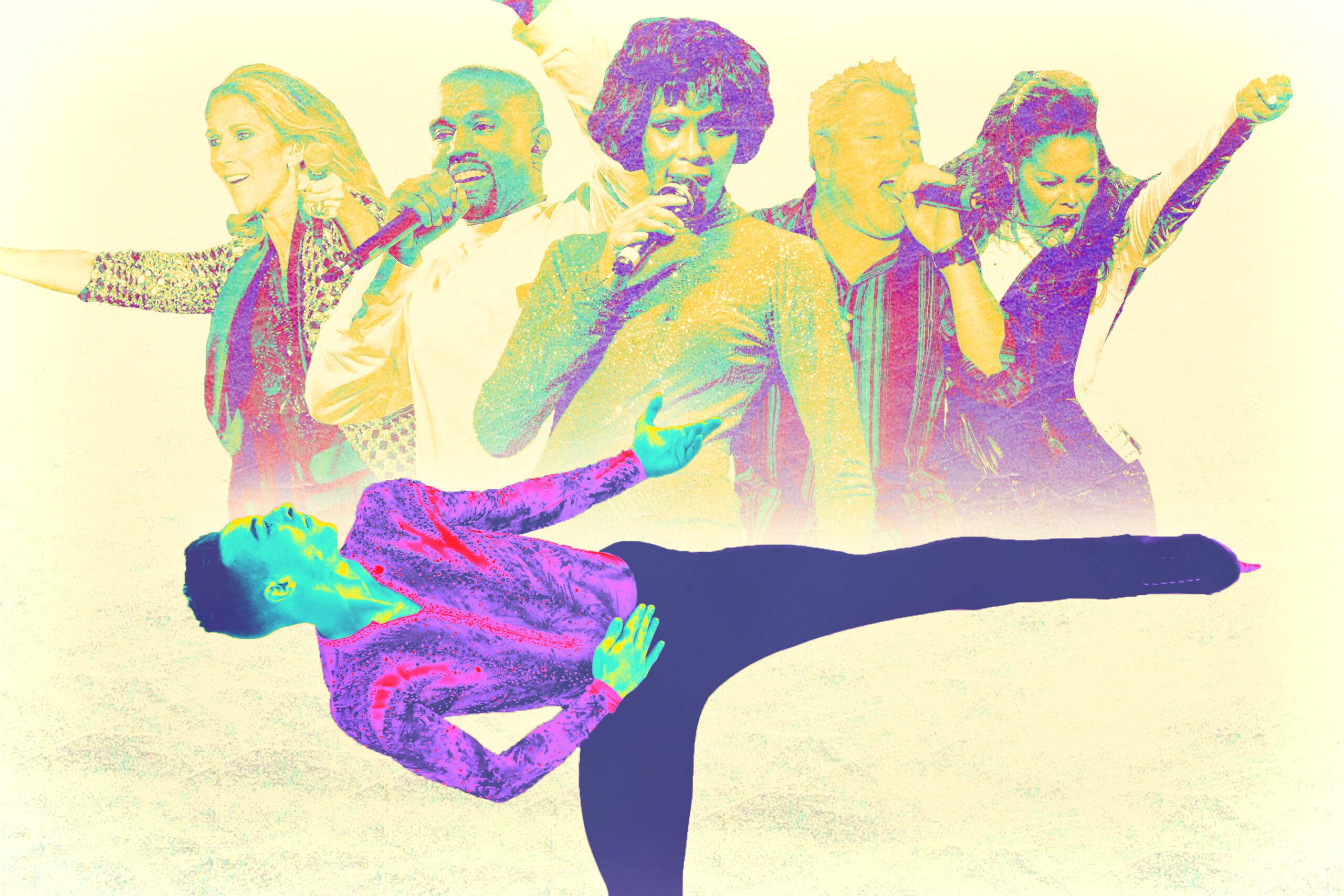Which Song Would You Choose to Figure Skate To?
For the first time in Olympics history, single skaters are allowed to perform to songs featuring lyrics, opening the door to a whole new world of possibilities. Naturally, Ringer staffers weighed in with the choices they’d make—from Kanye West to Smash Mouth and beyond.
The 2018 Winter Games mark the first time in Olympic history that all figure skaters—not just ice dancers—are allowed to skate to music with lyrics. This has prompted this year’s Olympians to skate to the Moulin Rouge! soundtrack, or to Coldplay, or to “Despacito.” It has also sparked a crucially important conversation: What would be the ideal song to figure skate to?
After plenty of soul-searching and deep examination, Ringer staffers came up with their choices. For the purposes of this exercise, please assume that everyone listed below has magically gained the grace of Adam Rippon and the triple-axel ability of Mirai Nagasu.
“It’s All Coming Back to Me Now,” Celine Dion
Lindsay Zoladz: There are three components to any great figure-skating song: melodrama, a vague-to-overt French Canadian vibe, and a sense that the song could be (or likely is) about making love to an attractive ghost. To say Celine Dion’s “It’s All Coming Back to Me Now” checks all three of these boxes is a gross understatement.
I can say firsthand that this is a beautiful song to accompany athletic feats of physical expression because I once participated in a choreographed group dance to it when I was a counselor at a summer camp. (We all “died” during the climactic part of the song, and then came back to life when the DJ put on Eric Prydz’s “Call on Me.” It was the closest I will ever get to the Olympics.) This experience required reading the lyrics of “It’s All Coming Back to Me Now”—and, like, when’s the last time you’ve really meditated on the lyrics of “It’s All Coming Back to Me Now”? Do you know that an actual line in this song is, “There were nights of endless pleasure / It was more than any laws allow.” Paging Virtue and Moir!
Any Song From My Beautiful Dark Twisted Fantasy, Kanye West
Rodger Sherman: The easy Kanye-inspired choice is “Ni**as In Paris,” which begins with a sample of a Will Ferrell line from 2007’s Blades of Glory: “We’re going to skate to one song, and ONE SONG ONLY.” (In the movie, the song was “My Humps.”)
But I cannot choose one song and one song only with Kanye. Early Kanye soul samples wouldn’t lend themselves to skating, and later Kanye machine music wouldn’t either. But MBDTF is one of the gaudiest, most ostentatious rap albums ever made. After thinking about it, I’m convinced: Every song on it would make for perfect figure skating music.
“Runaway” would be great—landing a lutz for the douchebags, a lutz for the assholes, a lutz for the scumbags, etc. “Power” would fit ideally—NO ONE MAN SHOULD HAVE ALL THOSE SALCHOWS. “Devil in a New Dress” is figure skating music; “Dark Fantasy” is figure skating music; “All of the Lights” is absolutely figure skating music.
The only song that seems like it wouldn’t easily lend itself to a routine is “Gorgeous,” but I have no doubt that Raekwon would power me through a phenomenal program. Kanye had ballerinas on the brain when he created MBDTF, as was made clear in the album art and the 40-minute-long music video. I’m sure Kanye knew one day this would be used in the Olympics.
“I Wanna Dance With Somebody,” Whitney Houston
Jonathan Tjarks: Figure skaters don’t get to talk on the ice. Their styles of skating and the types of programs they put together are the only ways they can express themselves during routines. This is a sport where actions speak louder than words, but sometimes you might want some words to help you out. And dancing, like skating, is not meant to be solitary. It’s supposed to be done with someone else. What better way to communicate that than to skate to one of the greatest pop songs of the late-20th century?
Who doesn’t like this song? The crowd will get into it, and that will help me with the judges. We played this song at our wedding. It killed.
“All Star,” Smash Mouth
Claire McNear: My ice-skating experience can be summed up in its entirety as a handful of panicked outings during which I dragged myself along the edge of a rink until my arms became too tired to carry on and then left wobbly, sore, and defeated as various friends and middle-school crushes zoomed past me. Even in a hypothetical fever dream that stars me as a gliding, sequined Olympian, I can assure you that the results would not be pretty. And where there is no hope—by golly, let there be infamy.
Imagine, for a moment, the look on the faces of the judges, audience members, and miscellaneous people and/or cats on your couch as that first, flat SOOOOOOMEBODY rings out from the speakers. Imagine realizing that you would be getting three-plus minutes of this. “The ice we skate is getting pretty thin”—could it be that Smash Mouth intended this usage all along? “The water’s getting warm so you might as well swim”—wouldn’t we all be better served by summer? Would you sing along? You would.
Would I have a goatee while skating to “All Star”? If it’d make you happy, my dear viewer, maybe I would.
“Baker Street,” Gerry Rafferty
Kate Knibbs: I know exactly what kind of figure skater I’d be: bold, decisive, magnetic, both timeless and a little kitschy, with powerful movements and a big old smile on my face. My skating costumes would have lots of sparkles, and the judges would complain about my lack of reverence—but also wipe away awe-induced tears at my glorious leaps.
So basically, it’s not very important that my skating song be pretty, or elegant. It just has to build into an undeniable, wailing BOOGIE, ideally with a touch of unexpected melancholy. That’s why I’m going with Gerry Rafferty’s “Baker Street,” otherwise widely acknowledged as the most classic cheesy sax anthem of all time, the soundtrack of late-night New York City intrigue as imagined by a child. It’s corny and beautiful at the same time, just like figure skating. I will win gold!!!!!!!!!
“Tonya Harding,” Sufjan Stevens
Alyssa Bereznak: This would be automatic self-sabotage, but it would be very Fiona Apple at the 1997 VMAs to (1) skate past the judges table and make searing eye contact with every single person there; and (2) glide to the center of the ice and perform to Sufjan Steven’s “Tonya Harding.” And I wouldn’t just give any old routine. I’d use the exact choreography that Harding did in the 1990 U.S. Championship, which also happens to be the footage for Stevens’s official music video. I’m aware that this would require me to complete a triple axel, but in this fantasy scenario, I am also ice skating at the Olympics, so anything is possible!
This would be delightfully meta, and it would also force the Olympic powers that be to confront their historically snobby figure skating standards in a very public way. Can you tell I’m fired up from recently watching I, Tonya?
“Youth,” Daughter
Michael Baumann: It appears that many of my colleagues are skating to music chosen to elicit internet “lols,” and that’s fine. But I’m after the only two prizes that matter: Olympic gold and the approval of Johnny Weir. For that reason, I’ve selected “Youth,” by English indie rockers Daughter.
It’s important to plan out how a gold medal–winning program sounds, as called by Weir. You could double the 17-second guitar intro here and still stay under the four-minute, 40-second time limit for a free skate, which would give me time to set up my opening quad-triple combo before the lyrics kick in. (Weir: “Baumann fell on this jump at nationals and has struggled to land it in practice all week. … Oh! But very well done there.”) Critically, “Youth” is an absolute tearjerker of a number about heartbreak and loss, and it’s all one big crescendo, which will suck in the crowd and keep me pumped in the back half of my program, where elements are worth 10 percent more.
As for where to put those elements: “Youth” has several instances in which the music cuts out near the end of one measure, only to come back in with a drumbeat at the start of the next. Those instances are perfect places to drop jumps. (Weir: “I love how Baumann ties his routine to the music—it’s like the crunch of the skate blades are just another instrument.”)
Those drumbeats are also perfect places to put those big hand motions that aren’t technically elements of a program but still seem like part and parcel of any successful routine, and lyrics such as “If you’re still breathing you’re the lucky ones / ’Cause most of us are heaving through corrupted lungs” practically beg for looping turns and wistful gazes toward the upper deck. (Weir: “This is just a heartbreaking routine—you can tell with Baumann it’s not just about the technical elements but the story he’s telling.”)
That story ends with one last chorus (time for a final jump) and an outro of a repeated running electric guitar line and heavy mallets on the tom-tom (the last couple of big spins) before dissipating into quiet to end the program.
Weir: “When Baumann’s on, there’s nothing like this program in the world, and he was on tonight.”
Eat my dust, Yuzuru Hanyu.
Janet Jackson The Velvet Rope Medley, Capped By “Dracula Mountain,” Lightning Bolt
Danny Chau: My long program would be influenced by both 15-year-old Russian supernova Alina Zagitova’s devastatingly beautiful (and inhumanly difficult) routine at the 2018 Winter Games and Janet Jackson’s The Velvet Rope, one of my favorite albums ever. I’d start off with the gorgeous, slow intro to “Together Again” and go straight through the first chorus. I’d use up my spins and step sequences on this first block of the performance.
After a brief intermission with “Empty,” I’d lead into the haunting, distorted violin breakdown at the 3:30 mark of “Velvet Rope” that would transition right into the relentless noise rock of Lightning Bolt’s “Dracula Mountain.” Shocking, and probably disgusting, I know. But this is where Zagitova’s influence comes in: As she demonstrated expertly in her routine in Pyeongchang, there is a 10 percent point bonus for jumps executed in the second half of the program. All of my jumps would be quad variants, including a double-quad-axel combo for maximum potential points.
If I fail (and I most certainly would—no one has landed a quad axel in sanctioned competition, period), there is nothing that would better soundtrack my eating of shit than “Dracula Mountain.” If I fail, I won’t be graceful. I will be thrashing.
Opening Theme From Visions of Escaflowne
Justin Charity: The romantic figure skating anime TV series Yuri!!! On Ice, which premiered two years ago, is already a proven hit with figure skaters worldwide. A few days ago in Pyeongchang, Japanese ice dancing pair Miu Suzaki and Ryuichi Kihara skated to the show’s opening theme song, “History Maker.” I love the show, and I love the song, but I’m still waiting for some of the more enterprising otaku Olympians to skate to the most angelic and graceful anime theme music of all time, the eponymous song from Visions of Escaflowne—a show I don’t even like all that much! If no one else will skate to this beautiful music, I will.
“Threnody for the Victims of Hiroshima,” Krzysztof Penderecki
Miles Surrey: Here’s a shocker: I am not an Olympic-level figure skater. In fact, I am not anything close to a person who can skate—every time in my life that I’ve made the audacious decision to step on the ice, I’ve fallen flat on my face. (Imagine putting on socks and running across a wooden floor covered in Crisco, and you get the idea.)
This prompt posits that every Ringer staffer has somehow acquired the ability to skate at an Olympic caliber, so I’m going to assume my skating talents are similar to Phil Jones on a football pitch: Against great odds, and despite looking like I could fall at any given moment, I don’t—or at least do so without being a total catastrophe. People are captivated. What better way to encapsulate this surreal feeling than skating to the sonic equivalent of smashing ice skates on the rink until the ice breaks? “Threnody for the Victims of Hiroshima” is my deserved spiritual skate jam.
“Two of Hearts,” Stacey Q
Sean Yoo: In a fantasy world where I become part of a world-renowned figure skating tandem with my wife, whom I obviously met while figure skating, there would be only one song to which we would skate. That song is Stacey Q’s 1986 smash hit “Two of Hearts” for a few reasons. First, it’s incredibly catchy, and if I’m forced to hear the same song on repeat while training for the Olympics, I wouldn’t mind it being this one. And second, Stacey Q sings the line, “two of hearts, two hearts that beat as one”—that’d be super fitting for my fantasy because, again, I would be madly in love with my wife/skating partner. Thematically, this would make sense.
I’d also have some choreography to draw on as inspiration. In the 2007 comedy “Hot Rod,” the title character (Andy Samberg) and his friend group casually dance to the song in a parking lot, and it’s safe to say their moves would absolutely impress Olympic judges. Also, while this wasn’t part of the prompt, I feel obligated to mention that this fantasy ends with my wife and me winning gold and emerging as a universally beloved celebrity couple.
“Bad Day,” Daniel Powter
Julie Kliegman: This is a song that exists; first and foremost, I want to use my moment in the international spotlight to remind people of that. I also think figure skating could benefit not only from more lyrics, but also from more unabashed, subpar, screechy, angsty lyrics. This is doubly true for me, a human who has ice skated maybe three times in my life.
“Bad Day” is going to be self-explanatory when I wipe out. Rest assured that when NBC pans to my coach talking me down, the words she’ll be mouthing to me are: “You had a bad day. The camera don’t lie.”
“Low Lights” and “Highlights” Medley, Kanye West
Jordan Coley: As someone who only watches figure skating for about a week every four years, I can tell you with the utmost confidence that the two most important components of any routine are “glidey smoothness” and “twisty fastness.” Naturally, the music accompanying a performance should complement these two modes. The best figure skating music has an emotional range. It starts slow and then races away. It brings you down low before it soars high.
A medley of Kanye West’s “Low Lights” and “Highlights,” the twin tracks from his 2016 hip-hop fever dream The Life of Pablo, is the only option. The two songs were built for someone to dance to while wearing a sequin bodysuit with knives strapped to their feet. On “Lowlights,” we hear the voice of a woman passionate and tender as she extols the power of faith in God. There’s a simple piano chord progression and slinking synth bass line behind her. It’s dramatic and over the top and a little cheesy. So, it’s figure skating. I’d stride across the ice, head bent back, hands raised above my head, mouthing triumphantly, “Someday, the sky above will open up.”
But wait! What’s that? Are those drums? Is that Young Thug? Yes, we’ve seamlessly transitioned into “Highlights.” I’m sprinting. “I bet me and Ray J would be friends [small twisty jump] / If we ain’t love the same bitch [slightly bigger twisty jump] / Yeah he might have hit it first / Only problem is I’m rich!” [BIG TWISTY JUMP].
I’ll collect my gold medal now. Thank you.
Wonder Woman Theme Music
Kate Halliwell: [cue guitar riff] DA DUN DA DUN DUN DUN DUN DUN DA DUN DUN DUN DUN DUN DUN ...
The Wonder Woman theme is, bar none, the most badass and instantly iconic superhero theme song … perhaps ever? That guitar riff gives me goosebumps each time I hear it, and I know it would make for a perfect, admittedly metal figure skating routine. I’d obviously wear a bedazzled version of the Wonder Woman costume (problematic male gaze issues aside, has any superheroine outfit ever been more ice rink ready?), and my already uncanny resemblance to Gal Gadot (cough) would mean that my program would go viral before you can say, “What I do is not up to you.”
Before you argue that the Wonder Woman theme has no lyrics, we all know that the best figure skaters mix their own audio together, so clearly I’d add the sound of bullets zinging off Wonder Woman’s bracers and the screams of men as she destroys them—not to mention the noise of every woman in the skating arena being simultaneously empowered in the presence of my routine. I am willing to skate for those who cannot skate for themselves!
“The Wreck of the Edmund Fitzgerald,” Gordon Lightfoot
Shaker Samman: The SS Edmund Fitzgerald was a shipping freighter that moved iron ore (26,000 tons or more) from port to port through the Great Lakes until it tragically sank after taking on water during a storm. How do I know this? Because in 1975, an artist named Gordon Lightfoot wrote and recorded a ballad explaining the ship’s demise. And it bangs.
Imagine me in the center of the ice, surrounded by darkness, before a single spotlight shoots out of the rafters, accompanied by the soothing melody of Lightfoot’s acoustic guitar. (I know Olympic figure skating routines are performed in full light, but just go with me here.) And then, he sings:
The legend lives on from the Chippewa on down
Of the big lake they call Gitche Gumee
[I complete four straight triple axels to open the program.]
The lake, it is said, never gives up her dead
When the skies of November turn gloomy
[I look directly at the judges, pantomiming myself receiving a gold medal, and continue to do so for the remainder of the prolonged sea chantey.]
When the drums kick in, I’d just start freestyling with no regard for the skills I’d be expected to display until either security escorts me off the ice or the crowd breaks out in rapturous applause, in awe of my creativity and willingness to push the boundaries of a sport in desperate need of a spark.


